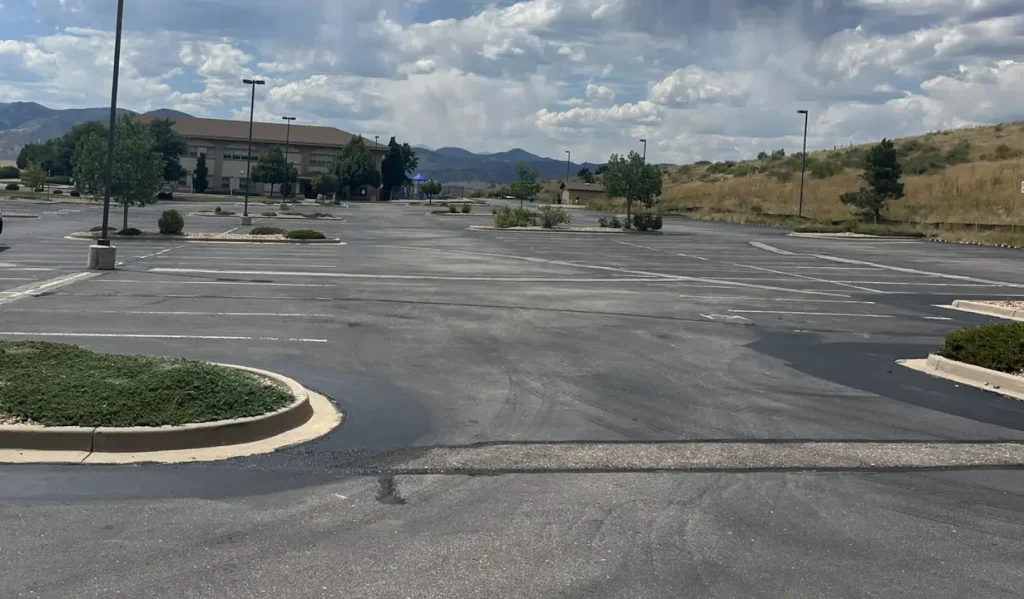If you’ve ever wondered why your parking lot starts cracking or fading sooner than it should, the answer is simple: Colorado Springs’ climate is uniquely harsh on asphalt. Between freeze-thaw cycles, intense UV exposure at elevation, and heavy traffic, parking lots here age faster than in most parts of the country. Understanding why helps you protect your investment and avoid costly repairs.
The Freeze-Thaw Cycle Never Stops Working
Colorado Springs experiences wide temperature swings—sometimes 30 or 40 degrees in a single day. That constant expansion and contraction puts stress on asphalt. When moisture seeps into small surface cracks, it freezes overnight, expands, and widens the crack. During the day, it melts and seeps even deeper. Over the course of a winter, this cycle repeats hundreds of times. What starts as a hairline crack in November can turn into a full-blown pothole by spring.
Routine crack sealing is the best defense. A $500 crack sealing service today can prevent a $15,000 resurfacing job in three years. It prevents water from seeping below the surface, where it can damage the base and shorten the life of your pavement.
Intense UV Exposure at 6,000 Feet
The high elevation in Colorado Springs means we’re closer to the sun—literally. UV exposure here is stronger than in most parts of the country. Over time, that sunlight breaks down the asphalt binder that keeps your pavement flexible. The surface becomes brittle, fades from black to gray, and starts cracking more easily.
Applying sealcoating every two to three years helps block UV rays, protect the binder, and restore the deep black finish that makes your property look well-maintained.
Water and Drainage—The Silent Killer
If you notice puddles that linger long after a storm, that’s a red flag. Standing water slowly breaks down the asphalt binder and weakens the base underneath. Eventually, the surface softens, cracks, and starts to unravel.
Some of the worst failures we see in Colorado Springs come from poor drainage design. Spring snowmelt and summer storms add to the problem. Often, a simple grading correction or valley gutter installation can make all the difference.
Beneath the surface, Colorado’s clay-rich soils expand and contract with changes in moisture. When the ground shifts, it stresses the pavement above, leading to dips, cracks, and base movement. That’s why proper sub-base preparation is critical for long-term performance.
Heavy Loads, Trash Trucks, and Delivery Vehicles
Certain areas of a parking lot carry more weight than others. Trash trucks, delivery vehicles, and large service trucks create deep ruts or depressions where they turn, stop, or idle. We often see this around dumpster pads, loading docks, and drive-thru lanes.
Those ruts hold water, which speeds up the damage. Once the base weakens, patching the surface won’t be enough—the repair usually requires full-depth asphalt replacement. We use thicker asphalt and stronger base materials in these areas to prevent the problem from returning.
Snow Removal and Salt Use
Snow and ice management is part of life in Colorado Springs, but it’s hard on asphalt. Plow blades scrape sealcoating and striping, and de-icing salts dry out the surface even faster. You can’t stop winter, but you can minimize damage by sealing your lot regularly and re-striping after each sealcoat cycle. That keeps it protected and looking professional through the harshest seasons.
Skipping Maintenance—The Fastest Way to Shorten Your Lot’s Life
Neglect is the primary reason parking lots fail prematurely. Cracks that could have been sealed for a few hundred dollars can quickly grow into thousand-dollar repairs if ignored.
A solid maintenance plan includes:
- Crack sealing every year or two
- Sealcoating every 2–3 years
- Timely patching of potholes and weak areas
If you stay consistent, you can easily double your pavement’s lifespan.
Extending the Life of Your Parking Lot
Colorado weather can be tough on asphalt, but a proactive approach makes all the difference. At Riley’s Asphalt, we help local businesses, HOAs, and property managers prevent problems before they become expensive repairs. Whether you’re in Colorado Springs, Parker, Castle Rock or the Denver Metro, we know the conditions your lot faces and how to keep it performing longer.
If your lot is showing early signs of wear, don’t wait for small cracks to become expensive problems. Contact Riley’s Asphalt today for a free inspection and estimate. We’ll show you exactly what your lot needs and how to maximize its lifespan.

